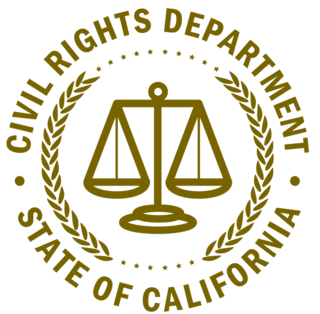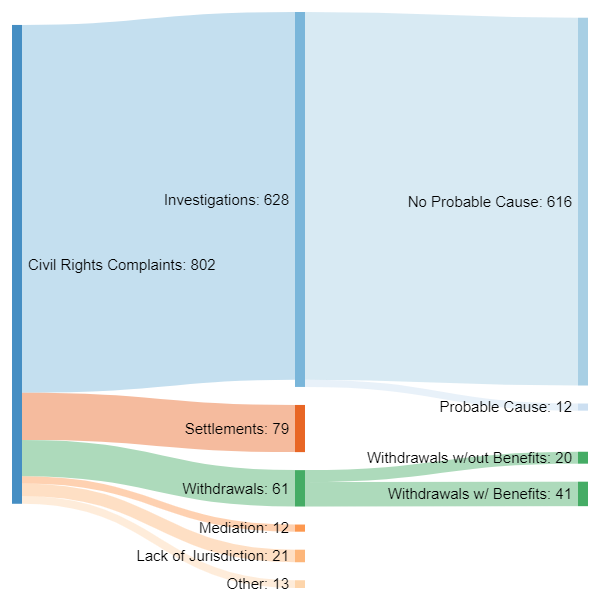
The Civil Rights Act of 1964 is a landmark civil rights and labor law in the United States that outlaws discrimination based on race, color, religion, sex, and national origin. It prohibits unequal application of voter registration requirements, racial segregation in schools and public accommodations, and employment discrimination. The act "remains one of the most significant legislative achievements in American history".

The Civil Rights Act of 1968 is a landmark law in the United States signed into law by United States President Lyndon B. Johnson during the King assassination riots.

The Equal Pay Act of 1963 is a United States labor law amending the Fair Labor Standards Act, aimed at abolishing wage disparity based on sex. It was signed into law on June 10, 1963, by John F. Kennedy as part of his New Frontier Program. In passing the bill, Congress stated that sex discrimination:

The U.S. Equal Employment Opportunity Commission (EEOC) is a federal agency that was established via the Civil Rights Act of 1964 to administer and enforce civil rights laws against workplace discrimination. The EEOC investigates discrimination complaints based on an individual's race, color, national origin, religion, sex, age, disability, genetic information, and retaliation for participating in a discrimination complaint proceeding and/or opposing a discriminatory practice.

The California Civil Rights Department (CRD) is an agency of California state government charged with the protection of residents from employment, housing and public accommodation discrimination, and hate violence. It is the largest state civil rights agency in the United States. It also provides representation to the victims of hate crimes. CRD has a director who is appointed by the governor of California and maintains a total of five offices and five educational clinics throughout the state. Today, it is considered part of the California Business, Consumer Services, and Housing Agency.

Equal employment opportunity is equal opportunity to attain or maintain employment in a company, organization, or other institution. Examples of legislation to foster it or to protect it from eroding include the U.S. Equal Employment Opportunity Commission, which was established by Title VII of the Civil Rights Act of 1964 to assist in the protection of United States employees from discrimination. The law was the first federal law designed to protect most US employees from employment discrimination based on that employee's race, color, religion, sex, or national origin.
Employment discrimination law in the United States derives from the common law, and is codified in numerous state, federal, and local laws. These laws prohibit discrimination based on certain characteristics or "protected categories." The United States Constitution also prohibits discrimination by federal and state governments against their public employees. Discrimination in the private sector is not directly constrained by the Constitution, but has become subject to a growing body of federal and state law, including the Title VII of the Civil Rights Act of 1964. Federal law prohibits discrimination in a number of areas, including recruiting, hiring, job evaluations, promotion policies, training, compensation and disciplinary action. State laws often extend protection to additional categories or employers.
Ledbetter v. Goodyear Tire & Rubber Co., 550 U.S. 618 (2007), is an employment discrimination decision of the Supreme Court of the United States. Employers cannot be sued under Title VII of the Civil Rights Act of 1964 over race or gender pay discrimination if the claims are based on decisions made by the employer 180 days ago or more. Justice Alito held for the five-justice majority that each paycheck received did not constitute a discrete discriminatory act, even if it was affected by a prior decision outside the time limit. Ledbetter's claim of the “paycheck accrual rule” was rejected. The decision did not prevent plaintiffs from suing under other laws, like the Equal Pay Act, which has a three-year deadline for most sex discrimination claims, or 42 U.S.C. 1981, which has a four-year deadline for suing over race discrimination.
A protected group, protected class (US), or prohibited ground (Canada) is a category by which people qualified for special protection by a law, policy, or similar authority. In Canada and the United States, the term is frequently used in connection with employees and employment and housing. Where illegal discrimination on the basis of protected group status is concerned, a single act of discrimination may be based on more than one protected class. For example, discrimination based on antisemitism may relate to religion, ethnicity, national origin, or any combination of the three; discrimination against a pregnant woman might be based on sex, marital status, or both.

The Office of Fair Housing and Equal Opportunity (FHEO) is an agency within the United States Department of Housing and Urban Development. FHEO is responsible for administering and enforcing federal fair housing laws and establishing policies that make sure all Americans have equal access to the housing of their choice.

Lesbian, gay, bisexual, and transgender (LGBT) persons in the U.S. state of Nebraska may face some legal challenges not experienced by non-LGBT residents. Same-sex sexual activity is legal in Nebraska, and same-sex marriage has been recognized since June 2015 as a result of Obergefell v. Hodges. The state prohibits discrimination on account of sexual orientation and gender identity in employment and housing following the U.S. Supreme Court's ruling in Bostock v. Clayton County and a subsequent decision of the Nebraska Equal Opportunity Commission. In addition, the state's largest city, Omaha, has enacted protections in public accommodations.

LGBT employment discrimination in the United States is illegal under Title VII of the Civil Rights Act of 1964; employment discrimination on the basis of sexual orientation or gender identity is encompassed by the law's prohibition of employment discrimination on the basis of sex. Prior to the landmark cases Bostock v. Clayton County, Georgia and R.G. & G.R. Harris Funeral Homes Inc. v. Equal Employment Opportunity Commission (2020), employment protections for LGBT people were patchwork; several states and localities explicitly prohibit harassment and bias in employment decisions on the basis of sexual orientation and/or gender identity, although some only cover public employees. Prior to the Bostock decision, the Equal Employment Opportunity Commission (EEOC) interpreted Title VII to cover LGBT employees; the EEOC determined that transgender employees were protected under Title VII in 2012, and extended the protection to encompass sexual orientation in 2015.
The Kansas Commission on Civil Rights (KCCR), originally known as the Commission on Civil Rights (CCR), was established in 1961 and continued until 1991 for the purpose of preventing unfair and illegal acts of discrimination against persons in Kansas. It consisted of a seven-member, unpaid-volunteer governing and review board, and a staff of paid investigators managed by an executive director.

Victoria Ann Lipnic is an American lawyer and public figure. She served in multiple senior United States government positions. She was Commissioner of the U.S. Equal Employment Opportunity Commission (EEOC), nominated to two terms by President Barack Obama, 2010 – 2020.) She served as Chair (Acting) of the EEOC under President Donald J. Trump from 2017 – 2019. Prior to her appointments to the EEOC, she was Assistant Secretary of Labor under President George W. Bush. The United States Senate confirmed her unanimously to each of these positions.
The Minnesota Department of Human Rights is a state-level governmental body in Minnesota tasked with investigating abuses of its human rights laws and educating the public about them.
The Wichita Civil Rights Equal Employment Opportunity Commission (CREEOC) - also known as the Wichita Civil Rights and Equal Employment Opportunity Commission or Wichita Civil Rights / EEO Commission - was an agency of the government of the City of Wichita, Kansas, active in the 1970s and 1980s, led by a volunteer board of civic leaders, appointed to oversee the operations of the Wichita Civil Rights / EEO Office, to investigate and review cases of alleged unlawful discrimination, monitor the implementation of the city's equal opportunity policies, and promote civil rights and equal employment opportunity for all populations in the City of Wichita.

The Iowa Civil Rights Commission is the state agency that enforces the Iowa Civil Rights Act of 1965, Iowa's anti-discrimination law.










